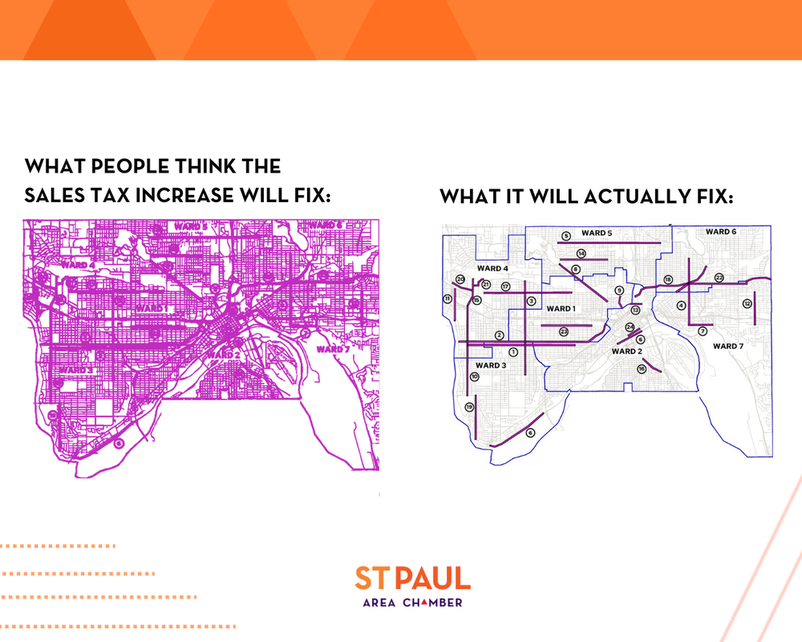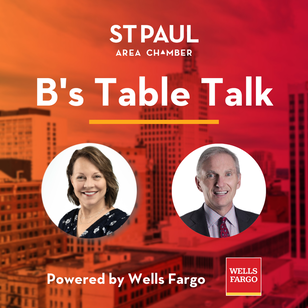Hear what David Schultz had to say about St. Paul’s proposed sales tax increase in October's episode of
|
Background:
During the 2023 Legislative Session, the St. Paul City Council asked the legislature to authorize the City to include a question on the November ballot asking voters to increase the local sales tax by one percent.
Under the proposal, .75 percent of the sales tax increase would be dedicated to street improvements and .25 percent would fund capital improvements to city parks and recreation facilities. This one-percent increase is estimated to generate $1 billion over 20 years.
Under state statutes, for a city to implement a local sales tax, the City Council must adopt a resolution, the Legislature must pass enabling legislation, and the Governor must sign the bill into law. While the House Tax Chair was unenthusiastic about allowing municipalities to increase local sales taxes, and the St. Paul plan is unusual in its request for a sales tax increase to fund basic city operations, the legislation passed as part of the larger tax omnibus bill.
This legislation facilitates the November 2023 ballot question. The City Attorney’s office will be tasked with drafting the ballot question while the City Council will pass a resolution to place the question on the ballot in November.
Ballot Question:
1.0% SALES TAX FOR IMPROVEMENTS TO STREETS, BRIDGES, AND PARKS
Should the City of Saint Paul establish a one percent (1%) sales and use tax over the next 20 years to generate $738,000,000 to repair and improve streets and bridges, $246,000,000 to improve parks and recreation facilities, and associated bonding costs?
Chamber Concerns:
When the sales tax proposal was introduced, the St. Paul Area Chamber surveyed our members. In response:
"St. Paul business owners are already worn down by government actions that negatively affect the city’s economic viability, including this year’s 14.65% city property tax increase, and a rent-control ordinance that has slowed local development and growth in the property tax base. Read more in the Pioneer Press.
"We’re still concerned. That would put us at 9.875% which would be the highest (sales tax) in the state from the cumulative effect of all these sales tax increases. We’ll become an outlier, when it’s just as easy to go to a surrounding community and end up spending less.” Read more in the Pioneer Press.
- Amanda Duerr, Vice President of Public Affairs, St. Paul Area Chamber
What Others are Saying About the Sales Tax Proposal:
During the 2023 Legislative Session, the St. Paul City Council asked the legislature to authorize the City to include a question on the November ballot asking voters to increase the local sales tax by one percent.
Under the proposal, .75 percent of the sales tax increase would be dedicated to street improvements and .25 percent would fund capital improvements to city parks and recreation facilities. This one-percent increase is estimated to generate $1 billion over 20 years.
Under state statutes, for a city to implement a local sales tax, the City Council must adopt a resolution, the Legislature must pass enabling legislation, and the Governor must sign the bill into law. While the House Tax Chair was unenthusiastic about allowing municipalities to increase local sales taxes, and the St. Paul plan is unusual in its request for a sales tax increase to fund basic city operations, the legislation passed as part of the larger tax omnibus bill.
This legislation facilitates the November 2023 ballot question. The City Attorney’s office will be tasked with drafting the ballot question while the City Council will pass a resolution to place the question on the ballot in November.
Ballot Question:
1.0% SALES TAX FOR IMPROVEMENTS TO STREETS, BRIDGES, AND PARKS
Should the City of Saint Paul establish a one percent (1%) sales and use tax over the next 20 years to generate $738,000,000 to repair and improve streets and bridges, $246,000,000 to improve parks and recreation facilities, and associated bonding costs?
- A vote YES means repairs and improvements to streets, bridges, parks, and recreation facilities would be funded through a new one percent (1%) sales and use tax.
- A vote NO means repairs and improvements to streets, bridges, parks, and recreation facilities would not be funded through a new one percent (1%) sales and use tax.
Chamber Concerns:
When the sales tax proposal was introduced, the St. Paul Area Chamber surveyed our members. In response:
- 73% opposed
- 16% supported
- 12% were unsure
- If approved by voters, the City of St. Paul would have the highest sales tax rate in the state (9.875%).
- In the 2023 Legislative Session, the sales tax for the seven-county metro was already increased by .25 percent to fund housing and .75 percent to support transit. The St. Paul proposal would yield a full two percent increase in sales tax rate this year.
- A higher sales tax rate for St. Paul would make the city a regional outlier, prompting consumers to migrate to lower-taxed neighboring municipalities.
- A sales tax is an economically regressive tax that impacts the hardest those least able to afford it.
- While true that the City of St. Paul is challenged with a high percentage of tax-exempt properties (22%) and a low property tax base, part of this problem is self-inflicted. The rent stabilization ordinance has curtailed development in St. Paul, negatively impacting the ability to grow to the property tax base.
- We fundamentally disagree with the use of sales tax revenues to fund ongoing operational functions of a city. The statute clearly states that local sales taxes may be approved for specific capital projects.
- Infrastructure maintenance is a core function of municipal government and should be a budget priority.
- While the current administration and City council may not be to blame for the condition of St. Paul streets, asking residents to vote to approve additional taxation to determine whether or not the streets are drivable abdicates their leadership role.
- Testimony in Senate Tax Committee (timestamp 21:19 through 38:34)
- Letter to Senate Tax Committee
- Letter to House Tax Committee
- Letter to Tax Conference Committee
- Public Comment to St. Paul City Council
- KARE 11 interview
- Pioneer Press Op-Ed with Midway Chamber
"St. Paul business owners are already worn down by government actions that negatively affect the city’s economic viability, including this year’s 14.65% city property tax increase, and a rent-control ordinance that has slowed local development and growth in the property tax base. Read more in the Pioneer Press.
"We’re still concerned. That would put us at 9.875% which would be the highest (sales tax) in the state from the cumulative effect of all these sales tax increases. We’ll become an outlier, when it’s just as easy to go to a surrounding community and end up spending less.” Read more in the Pioneer Press.
- Amanda Duerr, Vice President of Public Affairs, St. Paul Area Chamber
What Others are Saying About the Sales Tax Proposal:
- “Sales tax increases are not an option. They are regressive upon the poor and especially in a city such as St. Paul which is not a major tourist center, they will fall more heavily upon residents who are already overtaxed.” - John Mannillo, Chair, St. Paul STRONG and David Schultz, Hamline University Distinguished Professor of Political Science
- “The mayor’s need to be creative in finding a solution for infrastructure needs” but she expressed concern about drawing major conferences, concerts and special events to the capital city. ·
- “While a 1 percent increase sounds small, it can be a deterrent for event planners looking for places to situate events…Many operators are still struggling.”
- “This is a fragile recovery and both downtown Minneapolis and downtown St. Paul are still struggling because of the lack of corporate travel,” Rammer said. “It’s getting better but we’re still lagging the national average. Contemplating any sort of additional fee is really tricky right now.” - Liz Rammer, former chief executive officer, Hospitality Minnesota
- “Sales taxes are both regressive and volatile.” - State Rep. Steve Elkins, DFL-Bloomington
- “We already paid for the roads and everything within our taxes…Why should we pay again to have them fix the roads? They want to double-tax us. We’re already paying for it.” - Bernae Verakruse, St. Paul
- "Why can't the city do what they expect their residents to do when they have a revenue shortfall: cut expenses," Constantino said. "I don't want to pay more to shop in my neighborhood." Carter's sales tax proposal comes weeks after city leaders approved an $805 million budget for 2023 that includes a nearly 15% increase in property tax collections. - Nneka Constantino, Elsa’s House of Sleep
- “It bewilders me that immediately after an astonishing 15% property tax hike, the mayor would propose a sales tax increase with the support of nearly the entire city council…Sales taxes are highly regressive, disproportionately impacting the poor — homeowners and renters alike — who must spend a greater portion of their income on taxable necessities. Now the administration wants to triple the city’s sales tax levy. The last thing we need now is yet another tax increase. How about instead of asking the Legislature to raise taxes on the poor, the city requests an increase of local government aid? Or even better yet, do what the rest of us have had to do in light of inflation — tighten our belts and cut unnecessary spending.” - Christopher Morbitzerm, St. Paul
Local discussions on the topic of Sales Tax Increase:
The Union Park District Council hosted a panel discussion on the City of St. Paul’s proposal to increase the sales tax by one percent to fund street reconstruction and park infrastructure. Amanda Duerr, VP of Government Affairs, participated on the panel to provide the business perspective on the initiative. View the discussion here.


